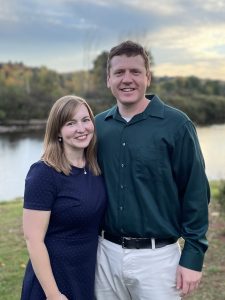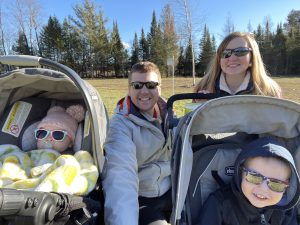Are you considering a career in healthcare and thinking about getting your doctorate degree in Physical Therapy?
Physical therapists are in high demand and the need for physical therapy professionals is set to grow in the foreseeable future, meaning high prospects for job placement after degree completion. According to the U.S. Bureau of Labor Statistics, the demand for physical therapists will continue to grow by 21%, which is much faster than average career growth.
In this Graduate Student Spotlight, we talk to Michael Richards, alumni of Clarkson’s Doctor of Physical Therapy (DPT) program located at Clarkson’s downtown campus in Potsdam, New York, about his experience in the program, what his career has been like so far, and why he’s excited to go to work as a physical therapist every day.
Clarkson University: Where did you get your undergraduate degree? What did you study?
Michael Richards: I received my undergraduate degree from Clarkson University. My bachelor’s is in Psychology with a minor in Biology and Cognitive Neuroscience.
CU: What is your current position and what company do you work for? What do you do in this role?
MR: I’m a staff physical therapist at the University of Vermont Health Network’s Elizabethtown Community Hospital. In addition to treating patients, I am also our hospital’s Center Coordinator of Clinical Education for all physical therapy, occupational therapy, and speech-language pathology students.
CU: What are your favorite aspects of your current role?
MR: I love working with patients in a small, tight-knit community where people appreciate everything you do for them. I also work with a great team of therapists and support staff at a hospital that puts patient care and its employees first.
CU: When and how did you know you wanted to become a physical therapist?
MR: I knew I wanted to do something that revolved around Sports Medicine in high school but it wasn’t until I spoke with a few physical therapists my senior year that I committed to it 100%.
CU: How did you find Clarkson’s PT program? Why did you ultimately decide to enter into it?
MR: After speaking with a graduate of Clarkson’s PT program, he piqued my interest in the school. On a subsequent tour of Clarkson, the student was also on the PT track and was a huge supporter of the program.
I later met the staff and was introduced to the idea of Problem-Based Learning through “Brittany’s Knee” and felt that hands-on learning was the way to go. In addition to receiving a variety of scholarships for undergrad, Clarkson’s doctoral program also held a spot for undergrad students with a pre-physical therapy focus if they maintained certain GPA requirements; that meant no unnecessary GREs.
CU: What were your favorite aspects of the PT program? Are you happy with your decision to pursue the Clarkson PT program?
MR: Problem-based learning was difficult, stressful, and confusing at times but it also made us better critical thinkers. Our class questioned everything and worked together to find the answers to questions the internet didn’t even know the answers to. In working so closely with one another and the staff at Clarkson, we also created a bond that will last a lifetime and that is something that I am forever grateful for.
CU: Can you talk about your clinical experience(s). What was it like? Were you able to be where you wanted geographically and facility-wise? How did the experience impact you?
MR: In order to avoid taking out additional student loans, most of my clinical experiences were in New York State. While some experiences were better than others, each of them helped shape the physical therapist I am today.
Clarkson’s PT program did an excellent job of preparing us to work with patients in a clinical setting and set us up for success when working with our peers. They also did their best to pair us with clinical instructors and sites where students had positive experiences in the past. I was literally blown away by how much I learned while on clinicals and cannot thank my clinical instructors enough for those experiences.
CU: Can you speak about your courses? What did you enjoy most about them?
MR: Once again, I loved the discussion component of problem-based learning. No one person or source can provide you with all of the information you need about a specific subject. In the same token, no one person has the time or insight to find all of that information; it definitely takes a team when it comes to healthcare.
CU: What excites or motivates you as a healthcare professional, especially in the current climate?
MR: Despite all of the negativity, fatigue, and burn-out currently surrounding healthcare, patients continue to be what motivate me. Whether it’s rehabbing a high school or college athlete back to their sport or helping a 90+ year old improve their strength in order to live at home independently, it’s always about them. We have to focus on success and learn from our shortcomings as a profession. That is what patients need and that’s what keeps them coming back when in need.
CU: What are your career goals? How did you end up in your current position?
MR: Interestingly, I am still working at the same facility I began at when I graduated 10.5 years ago and wouldn’t change it for the world. As far as goals, I just want to continue to learn. I thrive off continuing education and love applying it as soon as possible to my patients. While I could see myself in a management role someday, I love working with people and don’t plan on giving that up anytime soon.
CU: Looking back, would you do it all again?
MR: Absolutely! After all, I met my wife at Clarkson and we helped each other through undergrad and the doctoral program. Now, we are raising two beautiful children as successful physical therapists in the Adirondack Mountains. What could be better?
CU: Anything else you’d like to add about the program?
MR: The health science-related staff at Clarkson University deserve a ton of recognition for their efforts for both the University and the students that have come through those doors. Not only were they excellent teachers but they were even better mentors and friends.


About the Graduate Student Spotlight Series
Deciding whether or not to attend graduate school can be a tough decision. In our Graduate Student Spotlight blog series, we showcase graduate students from our 20+ different graduate degree programs to share their experiences and help prospective students understand whether graduate school may be the right choice for them.




